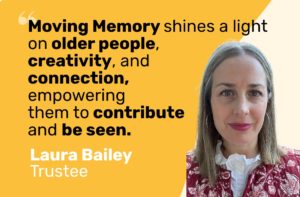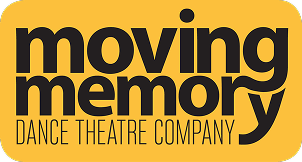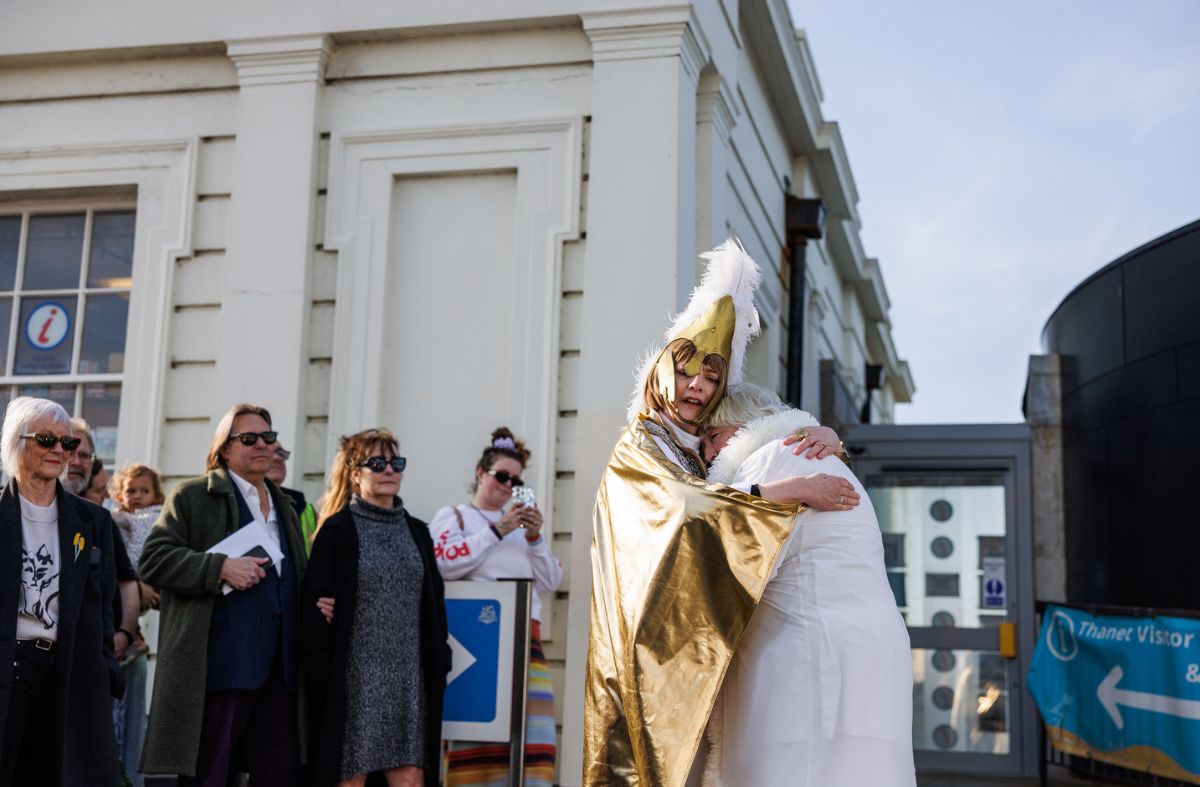It’s Trustees Week – a time to celebrate the achievements of nearly one million trustees across the UK. At Moving Memory, our trustees do so much more than govern: they champion creativity for older people, help us put participants centre stage as co-authors and support everything from bold ideas to the little mischievous moments that make our work unique. We simply couldn’t do it without them.
To mark the occasion, we spoke with one of our trustees, Laura Bailey from Creative Health Stories, about where Moving Memory’s work sits in the creative health field, what drew her to our work and how she envisions the future.
Laura has been working in the fields of creative health and cultural placemaking for over 15 years. Over this time, she has developed insight, knowledge and skills from direct delivery with communities, artists, creative and VCFSE organisations to strategic visioning and implementation.
Read the full interview below.
You’ve worked in the creative health field for over 15 years. What first drew you to this field, and how has your understanding of creative health evolved over time?
When I was at school the only subjects I was good at were English and Drama. I was always really moved by people’s characters and social issues. The books and plays I loved the most were ones that addressed social or moral issues or went deep into the human psyche – for example A Taste of Honey by Shelagh Delaney, Top Girls by Caryl Churchill, To Kill a Mockingbird by Harper Lee, and anything by Willy Russell or Roddy Doyle.
I remember being taken to see The Three Lives of Lucie Cabrol by Théâtre de Complicité and it having a big effect on me. But I ended up doing a degree in Sociology. It was my way of exploring my interest in people. After university I worked in picture archives for a bit and the music industry but eventually in community arts and heritage.
In 2013 I got a job in the culture team at Kent County Council and that’s where arts and health (or creative health as we now call it) started for me – it enabled me to bring together my interests in creativity, people and society – building partnerships between the creative, health and voluntary sectors across Kent. I demonstrated how the creative sector could support health and wellbeing outcomes to commissioners and policy makers.
When I first started, it was a relatively new idea and didn’t have much visibility. However, I would argue that using art, culture and creativity as a way of supporting community, wellbeing, social connectedness etc. is not new at all and is something inherent to being human.
Now, there are specific creative health roles, big research programmes and lots of policy work happening, alongside a greater amount of explicit creative health work in communities. Working on creative health initiatives from all angles has really deepened my understanding and helps me to join all the dots.

What inspired you to join the board at Moving Memory? How does our mission align with your own values and experience in creative health?
I’ve known Creative Director Sian Stevenson from when I joined KCC in 2013 and have been a champion of their work since then. I’ve always valued the integrity, boldness and humour in their work. I was really honoured to be asked to join the board.
There is clearly a strong alignment between my own work in the creative health sector and Moving Memory’s mission. I absolutely love the company’s aim of ‘putting the older body centre stage’ — celebrating movement, story and embodied experience. The work especially resonates with me as a middle-aged woman and one who has struggled with body image and confidence.
Dance and movement make me happy and I want everyone to be able to find joy in that way – along with all the other brilliant things it does for you – right up until the end of life. I’ve been involved with a few creative projects for older people over the years and seen how fantastic they are to enable older adults to express themselves, feel confident, stay active and stay engaged in their communities.
I feel really proud of the work the Moving Memory team do. They are a wonderful group of passionate, caring and talented people who work really hard to make a difference to older people’s lives. Their work on creative ageing also fits within the broader strategic creative health work I do looking at the role of creativity across systems; within clinical and community settings and across the life course. They’ve been at the forefront of this for years and are an example of good practice.
As a trustee, what do you enjoy most about your role, and how do you see yourself contributing to Moving Memory’s ongoing work in creative ageing?
It’s a pleasure to work with such a lovely bunch of people – all experts in what they do. I always learn something or come away from our meetings with new ideas and thoughts.
I’ve always enjoyed being at the intersection of strategy, creativity, community and wellbeing and so I hope that’s what I bring – that ability to see the big picture, understand different perspectives, ask the right questions, support connection with partners and hopefully help shape a sustainable future for the organisation.
My experience in creative health delivery and strategy, particularly around how to embed creative health in places and within the evolving health sector landscape, means I hope to be able to support Moving Memory in thinking about how they can fit into the NHS 10-year plan, particularly neighbourhood health models and prevention. Having a national policy-focused role means I can offer perspectives, information and insight from other places and organisations doing similar work.
My audio work also allows me to bring ideas to the board, as I’m often interviewing older people about their lived experience of health issues and how creativity is supporting them.
In your view, how does Moving Memory contribute to the wider creative health landscape?
Moving Memory plays a really important role in the creative health landscape by shining a light on older people and movement/creativity as a means to connection, wellbeing and agency. We have an ageing population but one that is not necessarily in good health, so ageing well is a significant issue for society, for government and the public purse. Loneliness and social isolation, being physically inactive and having poor mental health and wellbeing are all significant health problems in the UK and Moving Memory’s work directly addresses these. More than this, their approach goes deeper and is designed to empower, give confidence and agency, and values older people’s creative contribution.
Their work provides opportunities for older people to connect with others, to share their experience and to co-create, thereby shifting the narrative from ageing as decline to ageing as active creative contribution — which in turn influences how older people are viewed.
Is there anything else you’d like to share?
Creativity is a public-health asset and a human right. It is integral to wellbeing, connection and resilience. Organisations like Moving Memory show how this can happen in practice. Their model for creative ageing could be and should be integrated into a preventative neighbourhood-based health and wellbeing offer.
I’m excited about opportunities for collaboration and scaling: for example, how creative ageing can be embedded in local and strategic authorities’ wellbeing strategies, how it can form part of social prescribing, and feed into positive, creative placemaking. Older people can keep contributing positively to community and society but only if we keep valuing them and creating conditions for them to do so.
Thank you to all the team for allowing me to be part of the journey.
If you would like to learn more about creative health in the arts and beyond, visit Laura’s Creative Health Stories here.
You can purchase the books Laura mentioned from independent UK bookshops through the links below. If you sign up to Give as You Live, 5% of all purchases will be donated to Moving Memory, supporting our work with older people. Learn more here.
- A Taste of Honey by Shelagh Delaney
- Top Girls by Caryl Churchill
- To Kill a Mockingbird by Harper Lee
- Willy Russell (author)
- Roddy Doyle (author)

